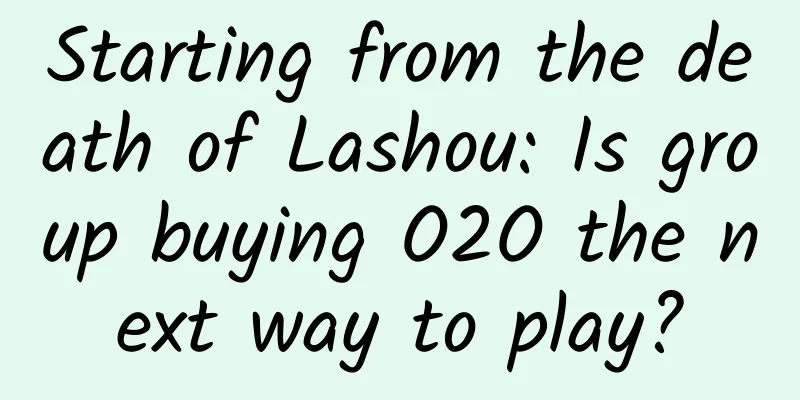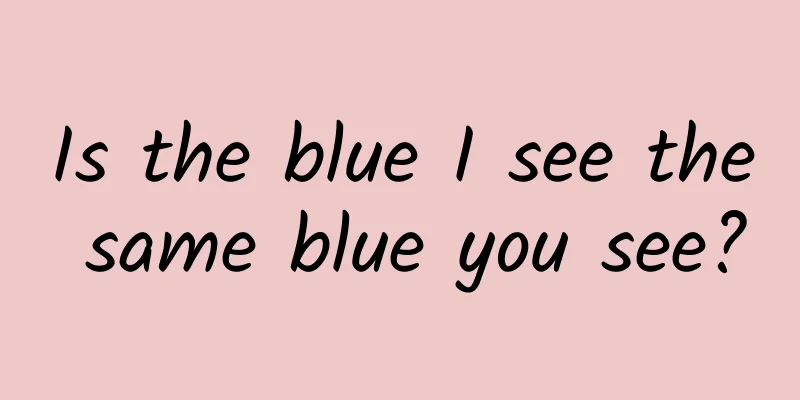Starting from the death of Lashou: Is group buying O2O the next way to play?

|
Lashou.com, a group buying website that once had out-of-control management and stuck to its early business model, was acquired, causing the "group buying is dead" theory to become popular again. E-commerce Jun believes that the prevalence of this argument stems from confusion about the concept of business model and misleading understanding of industry development. Is group buying dead? Yes, it is dead. The Groupon-like group buying model has long been unsustainable. The mainstream group buying platforms that remain in the market are no longer Groupon-style group buying, but a kind of life service O2O model that is derived from group buying and mainly based on discounts. This life service O2O business model was initiated by group buying websites, so we will temporarily call it the "group buying O2O model." Why did the Groupon-like group buying model die? The key is not whether its business model is profitable, but that group buying is not a rigid demand of users of life service O2O and lacks commercial imagination. Group buying is just one of the use scenarios of life service O2O. The most typical group buying is that the merchant provides a package discount plan, forming a virtual product in the form of a coupon, and then consumes it within a certain time range and specified location. In addition to the customer attraction function and price advantage, group buying neither helps merchants solve the O2O profit problem (price discounts are based on the premise of damaging the interests of merchants), nor does it provide consumers with practical convenience (it is just cheap, but the efficiency and user experience are not high). In the opinion of e-commerce experts, group buying is an extremely rudimentary form of O2O product for life services. The services provided by group buying are not truly essential needs for users (except for movie ticket discounts). Its greatest role is to complete the mission of connecting users and merchants in the early stages of O2O and to cultivate the usage habits of O2O users for life services. Therefore, when the group buying business of just-needed needs such as movie ticket coupons became popular among consumers, group buying websites led by Meituan began to weaken the concept of group buying and transformed themselves into services that are more in line with the just-needed needs of O2O users by focusing on discounts, such as expanding functions such as online reservations, online ordering, and hotel reservations, and wading into the takeaway business that is just-needed by "geeks and housegirls". It can be said that discounts have gradually become an important part of the group buying O2O model, but they are no longer the cornerstone of the group buying platform's business model. Solving the consumer pain points of life service O2O has become a new starting point for each group buying platform to build its business model. More importantly, during the transformation process, group-buying platforms gradually became comprehensive O2O platforms with both transaction and advertising functions, which can provide merchants with more diversified marketing services, thus deriving a profit model similar to Taobao. In other words, group-buying platforms earn certain transaction fees through the closed-loop transaction model of reviews through preferential services, and earn advertising fees through promotion and opening platforms. In addition, a few group-buying platforms such as Dianping and Meituan.com are also gradually testing the waters on the road to ecological development. For example, Dianping.com is trying to establish a diversified revenue model through an open platform model. Meituan.com, on the other hand, has established a comprehensive O2O platform for food, drink, entertainment and fun through its scale advantage. At the same time, it has split off three sub-businesses, namely Maoyan Movie, Meituan Takeaway and Meituan Hotel, to seize market share, and use the mutual assistance of large and small platforms to strengthen the ecological effect of the platform. Therefore, E-commerce Jun believes that since the business model of group buying O2O has been transformed into a comprehensive service platform of O2O life services that focuses on preferential treatment, and has carried out ecological layout in the vertical and horizontal directions of the industrial chain, the group buying O2O platform will not only not die, but has great development potential and great commercial imagination space. However, the group purchase O2O model also has its limitations: First, group purchase O2O is only a model and format of life service O2O, and it may face platform bottlenecks when building a larger O2O ecosystem. Second, it is difficult for group purchase O2O to form a true O2O closed loop in the mobile Internet era, so the value-added services that can be provided are limited, and the ceiling of revenue growth is basically visible. Third, the mainstream platform of local life service O2O in the future will be a comprehensive intermediary service platform that realizes multi-channel and multi-level information display through LBS technology. It is difficult for group purchase O2O platforms similar to shopping malls to successfully transform. Finally, what I want to say is that the future of the O2O life service battlefield belongs to BAT. Their advantages in building a large platform and a large ecosystem are far beyond the reach of group-buying O2O platforms such as Meituan and Dianping. However, group-buying O2O is not completely hopeless. Just like in the e-commerce field, JD.com and Alibaba cannot destroy each other, and Vipshop can even survive independently. The root cause is that the business models of the three companies meet different user rigid needs and consumption habits, and thus establish a competitive barrier that others cannot replace. Therefore, the biggest reason why I am optimistic about group-buying O2O is that its business model cannot be replaced, and it has competitive advantages that BAT finds difficult to surpass in terms of cultivating offline merchant resources. As a winner of Toutiao's Qingyun Plan and Baijiahao's Bai+ Plan, the 2019 Baidu Digital Author of the Year, the Baijiahao's Most Popular Author in the Technology Field, the 2019 Sogou Technology and Culture Author, and the 2021 Baijiahao Quarterly Influential Creator, he has won many awards, including the 2013 Sohu Best Industry Media Person, the 2015 China New Media Entrepreneurship Competition Beijing Third Place, the 2015 Guangmang Experience Award, the 2015 China New Media Entrepreneurship Competition Finals Third Place, and the 2018 Baidu Dynamic Annual Powerful Celebrity. |
<<: Reflections on the chaos of "Internet thinking": products, communities and self-organization
>>: Group buying ends: How does Hongtu Sanbao “blend” Lashou?
Recommend
China will build a near-Earth asteroid defense system to provide a "protective umbrella" for the Earth
Recently, my country announced that it will estab...
The traffic dividend has disappeared, where is the way out for the promotion of small and medium-sized apps?
The truth behind the disappearance of traffic div...
Which Wenchang Pagoda is the most effective? The truth is finally revealed!
Wenchang Tower is the most common Feng Shui masco...
Recognize text from image API offline
The image recognition text API is offline. Recogn...
Did the Lifang system affect the people's "freedom to open the door"? Looking at the planning of ancient Chinese cities from the perspective of the Twelve Hours in Chang'an
one Seen from the ancient Tang Chang'an The p...
Although both are bubbling joy, the bubbles in champagne and carbonated drinks are different?
In the cold winter, hot and spicy hot pot and coo...
Is Baidu information flow advertising worth doing?
In the information flow advertising market, big p...
Give archaeology a helping hand! Technology prevents "cultural relics tragedy" from happening again
In the long history of China over 5,000 years, th...
Jiaxing Mini Program Customization Company, how much does it cost to customize a nutritional product mini program?
How much is the quote for customized nutritional ...
World Hate Cilantro Day丨Does cilantro smell good or bad to you?
Science Fiction Network, February 24 (Xu Mingyang...
How do iOS 12 and Android 9 fight phone addiction?
In iOS 12 and Android 9 Pie, both Apple and Googl...
Why do the groups you created eventually become dead groups?
If you create a community just for the sake of cr...
Skipping breakfast can easily lead to 3 diseases! The first one torments many people...
Today's young people are really too difficult...
Can you tell if your blood vessels are blocked by running? Cardiovascular doctors debunk rumors: It's not that simple
Once the blood vessels are blocked, our organ tis...
How to promote APP efficiently in the early stage?
How to carry out initial promotion of APP? In fac...









